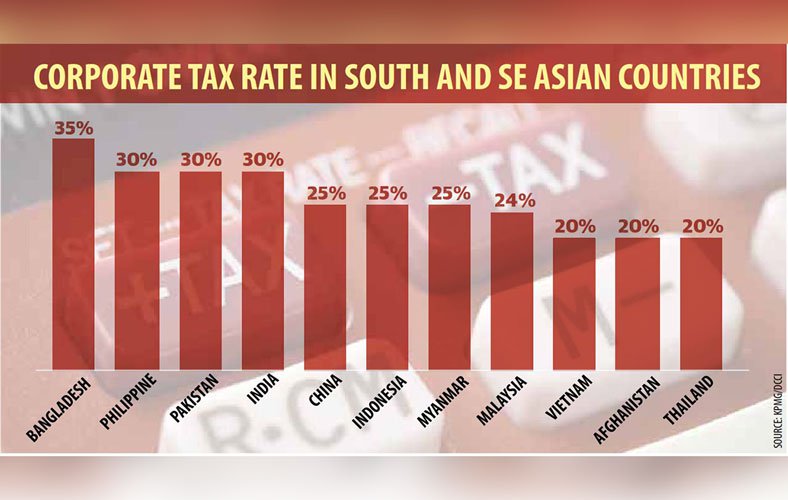As per direction of the current budget, a company doing business in Bangladesh has to pay 35% corporate tax, which is 25% for a publicly traded company while the maximum rate extends up to 45% for some sectors
Bangladeshi entrepreneurs pay the highest corporate tax among the South Asian counties, which they point out as an impediment in the way of attracting new investments.
As per direction of the current budget, a company doing business in Bangladesh has to pay 35% corporate tax, which is 25% for a publicly traded company while the maximum rate extends up to 45% for some sectors.
Businesses in other South Asian countries are paying corporate tax ranging between 6% and 15% whereas Bangladesh’s corporate tax rate is higher than the global average as well as the Asian average rate.
According to Tax Foundation data, a Washington-based think tank on US tax policies, the worldwide average statutory corporate income tax rate, measured across 208 jurisdictions, is 23.03% and the Asian average corporate tax rate is 20.65%.
Vietnamese entrepreneurs pay 20% corporate tax while it is 24% in Malaysia, 25% in China, 25% in Indonesia, 25% in Myanmar, 29% in Pakistan, 30% in India and 30% in Philippines, according to data of Dhaka Chamber of Commerce and Industry (DCCI).
By reducing corporate tax rates gradually, Bangladesh can attract more investment from home and abroad, which will generate more employment, think business insiders.
“Corporate tax cut will create more investable liquidity in a corporation, which will lead to investment in new projects or expansion,” Abdus Salam Murshedy, managing director of Envoy Group, has told the Dhaka Tribune.
According to a research of American Bureau of Economic, if corporate tax is reduced by 10%, it will increase investment worth 2% of the gross domestic product (GDP) of a country.
Corporate tax rate should be rational and compatible with the regional rate, otherwise it would be difficult to attract foreign investments, notes Salam Also, a former BGMEA president.
“Investment will fly to where there will be more incentives or less corporate tax rate,” he says.
On the other hand, he adds, if the tax rate is reasonable, business people will be more interested to pay taxes and will not think about dodging it.
“Higher corporate tax is not good for investments. If Bangladesh wants to attract foreign investment, it has to offer incentives,” Policy Research Institute (PRI) Executive Director Ahsan H Mansur has told the Dhaka Tribune.
Reducing the corporate tax rate can be a way to draw forging investors’ attention, he says, however, adding that if the investors do not reinvest, the government should stop the benefits.
How best to cut corporate tax rate
To avert the impact on revenue collection, business people suggest that the government go for a progressive tax rate and gradual reduction.
“To avoid adverse impact on revenue collection caused by cut of corporate tax rate, the government should reduce tax rate gradually such as 2%, 2.5% and 3% in the next three budgets,” former DCCI president Abul Kasem Khan has told the Dhaka Tribune.
To reap benefits from tax rate cut, Kasem suggests the government has to ensure that the gains from the cut are invested in productive sector, infrastructure and that the money is not spent in buying luxury goods or declared dividends.
Also, he says, a company has to show the data of what investment it has made to receive tax benefits from the government.
Economists, however, are not in full agreement with the demand of the business people and stress proper implementation of financial reporting to avoid the revenue losses due to corporate tax cut.
“Correlation between corporate tax rate cut and new investments does not strongly exist in Bangladesh. This is because of weakness in financial reporting,” Centre for Policy Dialogue (CPD) research director Khondaker Golam Moazzem points out.
It may not happen in all the cases that entrepreneurs will increase investment in case of corporate tax cut, he sounds skeptical and stresses proper implementation of financial reporting to ensure reinvestment of money gains from the corporate tax cut.
There should be a mechanism, he suggest, so that the government can know if the amount gained from the tax cut is invested or not.
He also puts emphasis on making audit firms accountable and transparent by strengthening the corporate financial reporting and ensuring penalty in case of false information provided in the report.
However, the government can consider the corporate tax rate taking into consideration factors such as gas and electricity prices hike that would increase the cost of production.
Demands of trade bodies
Ahead of the upcoming national budget for the fiscal year 2019-20, the country’s leading chambers and associations have urged the National Board of Revenue to reduce corporate tax gradually.
The DCCI has proposed lowering corporate tax to 25% for the next fiscal year to increase private sector investment and create scope for employment generation.
The Metropolitan Chamber of Commerce and Industry (MCCI) has demanded corporate tax cut in the upcoming budget.
Meanwhile, the apparel makers have also urged the government to reduce corporate tax from 12% to 10% for the next fiscal year. Primary textile sector people have also called for reducing corporate tax to 12.5% instead of existing 15%.




